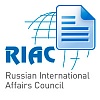Publications Review 1.03.2013
In
Login if you are already registered
(no votes) |
(0 votes) |
In this issue you will find: Deterrence in Northeast Asia, US-China Relations, Global Economic Outlook, New book by A.P. Tsygankov.
 Latest newsletter of Honolulu-based Pacific Forum CSIS (PF CSIS), issued on the 28th of February is dedicated to the problem of extended deterrence in Northeast Asia, and in particular on Korean peninsula. PF CSIS senior fellow for Nonproliferation and Disarmament David Santoro also overlooks recent developments around the Senkaku/Diaoyu Islands disputed between China and Japan.
Latest newsletter of Honolulu-based Pacific Forum CSIS (PF CSIS), issued on the 28th of February is dedicated to the problem of extended deterrence in Northeast Asia, and in particular on Korean peninsula. PF CSIS senior fellow for Nonproliferation and Disarmament David Santoro also overlooks recent developments around the Senkaku/Diaoyu Islands disputed between China and Japan.
 Another Pacific Forum CSIS newsletter issued one day earlier on February 27, covers the topic of US-China relations. According to its’ authors (L.A. Dunn, R. Cossa, and Li Hong):
Another Pacific Forum CSIS newsletter issued one day earlier on February 27, covers the topic of US-China relations. According to its’ authors (L.A. Dunn, R. Cossa, and Li Hong):
“Building a stable and cooperative “win-win” strategic relationship serves the interests of both the United States and China. It would contribute to both countries’ security interests, not least by avoiding dangerous military competition, confrontation, or even conflict between our two countries in the years ahead”.
 Third issue of Andrei P. Tsygankov’s book “Russia's Foreign Policy Change and Continuity in National Identity” was published Rowman & Littlefield in February and is now available for purchase. A.P. Tsygankov is professor of international relations and political science at San Francisco State University, you can read some of his papers here (free of charge).
Third issue of Andrei P. Tsygankov’s book “Russia's Foreign Policy Change and Continuity in National Identity” was published Rowman & Littlefield in February and is now available for purchase. A.P. Tsygankov is professor of international relations and political science at San Francisco State University, you can read some of his papers here (free of charge).
On February 27 the German Marshall Fund of the United States issued two briefs on Turkey:
In his paper "Turkey-EU Relations: Back to Basics?"; Dr. Alessandri argues that even though France's decision to lift its veto on one of the five chapters of EU accession negotiations with Turkey could be the beginning of a promising new cycle, Turkey is not necessarily any closer to becoming an EU member.
 In his analysis titled "Avoiding a Shrinking EU in an Expanding Planet: A Turkish Contribution to the Debate on Europe's Future" Dr. Kaleağası presents four alternative scenarios for the future of the European Union: "Europa Mercãtus", "Europa Nostrum", "Europa Progressio" and "Europa Et Cetera".
In his analysis titled "Avoiding a Shrinking EU in an Expanding Planet: A Turkish Contribution to the Debate on Europe's Future" Dr. Kaleağası presents four alternative scenarios for the future of the European Union: "Europa Mercãtus", "Europa Nostrum", "Europa Progressio" and "Europa Et Cetera".
(no votes) |
(0 votes) |





